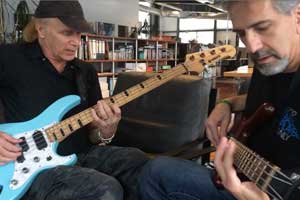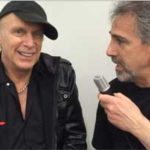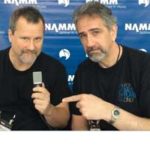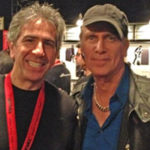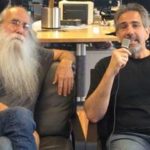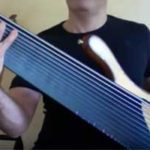Billy talks to FBPO about Niacin’s newest release, “Krush,” plus insights on bass technique, the music business and some surprises!
Exclusive interview with FBPO’s Jon Liebman
May 6, 2013
Originally from Buffalo, New York, Billy Sheehan is best known for his bass playing with Talas, Steve Vai, David Lee Roth, Mr. Big and Niacin. Billy has earned numerous awards and distinctions for his bass playing, including multiple readers’ polls from Guitar Player magazine, which also inducted him into its “Gallery of Greats.”
Sheehan’s acclaim as a bass player extends to all points across the globe, including Japan, where Billy has won the prestigious Player Magazine readers poll for Best Bass Player an unprecedented 14 consecutive times, as well as Burrn! Magazine’s Readers Poll five times.
With his signature chording, two-handed tapping, right hand “three-finger picking” technique and controlled feedback, Billy Sheehan is said to be responsible for changing the way the bass is played today.
FBPO: Tell me about Niacin. I know the band’s been around for a while but it’s not quite like anything else you’ve done. Tell me how the band came together and what inspired its formation.
BS: Guitar World magazine was doing a compilation CD and they asked me to play on it. I said, well, this is for Guitar World and I play bass. I’m very honored that you asked me, but I want to try a little twister and have no guitar and do something with a B3. So they said sure, it would be an interesting novelty.
In the early days of rock & roll, back in the ’60s, it was more important that you had a B3 player than a guitar player. Guitar players would come and go, but a lot of the great bands were B3 bands. A lot of the songs and a lot of the music was built around that so much, like “Gimme Some Lovin’” from the Spencer Davis Group and the Young Rascals and so many other B3 bands. It was an essential thing. So I kind of went back to that time period and said let’s do it with bass, drums and B3.
It turns out an acquaintance of mine, John Novello, happened to be a grand champion B3 master from the old days, you know, with the Leslies and the all the push and pull drawbars. So I got him and I said we want to use the drummer from Mr. Big, Pat Torpey, to do a track. We called it Niacin because it had a B3 and Niacin is Vitamin B3. So that was the joke.
FBPO: So that’s where the name comes from!
BS: Yeah. We submitted that with Pat Torpey on drums for that track. But we loved doing it so much, we thought we should do a whole record like that. Pat was busy at the time, so I said to John, “Who’s your favorite drummer in the world?” and he goes Dennis Chambers. Who’s yours?” and I go “Dennis Chambers.” So we got in touch with Dennis and said we wanted to do a record based on the B3 and he said that would be great. We flew him out and did the first record. I was so pleased with it, it was just one of my favorite records I’ve ever played on. It just had so many elements to it that I absolutely loved, compositionally, sonically and “Dennis Chambers-ly.” To me, he’s the greatest musician I know on any instrument. And so we did the touring on the first record, then second, third and fourth, and this one here I think is our fifth or sixth.
FBPO: The new one, Krush, is the sixth, according to your record company.
BS: So we’ve done this a lot and through the years evolved with it. Playing together live at first was a great experience for me. My whole life, I’ve played in rock bands. I’m lucky to have played with some great drummers, mostly rock and rock-oriented. Dennis came in with that feel that he has and his utter mastery of timing. It just changed my life. It was an incredible, incredible experience for me. I’m a better bass player because of Dennis Chambers, that’s for sure. The world is a better place because of Dennis Chambers. I think very highly of him. His contributions to this project are great.
FBPO: The first thing that got my attention with Krush was the relentless energy put forth by everyone. How do you do that?
BS: Well, I don’t know. I just love to play. When I’m playing and when I’m on stage, the world just fades away. You feel no pain. I never had any natural talent or natural ability. I pursued it because I loved it so much and I love playing so much and I love music so much. It’s natural to pursue it with vigor, with energy and enthusiasm and I get such joy out of it. My iTunes, as of this morning, has up to about 182,000 songs, over a terabyte of music. One of my favorite things to do on a Friday or Saturday is have some friends over, pop open a bottle of red and go through the iTunes and listen to some amazing stuff and turn people on to some great music that they may not have known about. It’s a passion of mine. People say to me, “Outside of music, what do you do?” Well, not too much! So that energy you get when you’re playing comes out.
Generally, when I do a track for somebody, if I’m in the studio, I like to go in the control room so I can hear everything really well. Suddenly, the energy level of the room as I start to play just gets crackly and tingly and I break out in a sweat. Even if it’s a ballad, I just get locked into it and put as much of myself into it as possible. The Niacin stuff, therefore, some of it being pretty daunting, really took some work and that energy found its course and ended up in the zeros and ones of that CD.
FBPO: I just took a peek at the interview we did on “For Bass Players Only” on January 31, 2011, and you claimed to have had 67,771 songs on your iTunes, 340+ gigabytes with more to come.
BS: I’ve tripled it. That’s hilarious! It’s all over the map, what I have. I’ve got a bunch of Jackie Gleason records from The Honeymooners, great lounge music and great arrangements, amazing songs. And Barney Kessel, an unbelievable guitarist! Just amazing, mind-blowing stuff. I also have a huge collection of garage rock from the ’60s. I can’t believe how many bands there were that recorded and put out records. I mean there were tens of thousands it seems, just an amazing amount of music. And not only in America. I have garage rock from Indonesia and Thailand and Korea and Finland and Africa and there’s some hilarious stuff. Incredibly bad, but so bad that it’s good. There is a bass in tune on about four or five percent of it. Every bass is miles out of tune!
FBPO: Strangely enough, I am familiar with that Jackie Gleason series that you were talking about.
BS: Yeah. It’s quite amazing.
FBPO: I met Barney Kessel once too. I was really into guitar before I got into bass. I saw him with a trio called “The Great Guitars,” with Charlie Byrd and Herb Ellis.
BS: Wow! That’s a trio!
FBPO: It was great. I went up and talked to him afterwards. I was 18 years old or so, so you’re bringing back some good memories. I want to ask you about the instrumentation here, the B3 trio. When I think of an organ trio, a lot of times it’s without a bass because the organ player takes care of most of that bottom end stuff with his feet, with the pedals. You and John do a great job of staying out of each other’s way. Did he have to alter his playing for his setting?
BS: Well, he didn’t use the kick pedals with his B3. He was mostly just a top player. Some guys do left-hand bass or do it with their feet. I grew up with a guy who was blind and he played feet. I was actually playing guitar at the time with him, when I was very, very young, so there wasn’t any concern about getting in the way of the bass player. Jimmy Smith, I think he did all the bass with his feet as well. It’s an interesting thing. It’s a choice. I think it frees him up to concentrate more on what’s going on with his hands than have to multitask.
FBPO: Are there any overdubs on that keyboard album? I’m just picturing this octopus with hands and arms all over these different keyboards!
BS: When we play live, he’s got everything in one big stack, one big pile, so he can jump from synth to keys. He’s also got the B3 MIDI’d. There’s a special MIDI controller built in to the B3, so when he plays something on the B3, it triggers whatever else you plug it into. Whether it’s a string thing or whatever else is going on, it can all be driven from the B3. It all works out really well.
FBPO: I wonder what Jimmy Smith would’ve thought of that!
BS: [Laughs] I’ve got tons of Jimmy Smith, too. Some great, great Jimmy Smith and Wes Montgomery.
FBPO: You are speaking my language!
BS: Oh yeah!
FBPO: Another thing that’s obvious to me is that this band, on this album especially, is very well rehearsed. It doesn’t sound like three guys just going into the studio to jam. There are some pretty intricate arrangements and complex rhythms, including a lot of unison lines and even a few tongue twisters with the bass and the keyboard. Who does most of the writing for Niacin?
BS: It’s split pretty much between me and John. It’s funny because my bass lines are not characteristic of what he plays on keyboard, and vice versa. So when I have to play his lines, a lot of times he’s on the keyboard and I’m on the fretboard and it doesn’t translate at all. It causes me to have to do some Olympic feat to try to play that line on the bass and sometimes it’s tough. But we never back down from it. Once we get something on there that’s possible, we just keep drilling at it until we get it.
I’ve done some bass stuff that’s for the keyboard and they both have their advantages. You can do some things on one that you can’t do on the other, and it’s difficult. Like some of the fast picking, single notes that you can’t do on the keyboard because you can’t hit one key that many times that fast. So there are a lot of things that don’t work on keyboard, but we shoot for it anyway. We come up with things. We’ll say let’s do this line here and later on John will try it. If it’s a written line, he’ll try and learn it and I have to piece him through it, piece by piece. Then he says the same thing with me, he goes, “Here’s the line, and it’s going to go like this.” He’ll send me usually a folder of the track slowed down so I can hear what the actual notes are and really pick it off. Then I’ve got to figure out my fingering patterns, how to get those notes off the fretboard and pick them as well. Now, I’ve got to get them up to speed. So, it’s quite a process sometimes just to do it and requires a lot of work. None of these Niacin records are just tossed together. There’s a lot of hard labor that goes into them.
FBPO: That’s very obvious. Another thing I really like is how you play around with different meters. There’s a tune called “Tone Wheels” that goes from 7 to a bar of 4 then back to 7 and then two bars of 4 and then repeats that pattern over and over again.
BS: Well, in my early days, way early on, one of my favorite artists was Frank Zappa and he did a piece called “Flower Punk” off of We’re Only in it for the Money. The verses are in seven and the in-betweens are in five. It’s an amazing song and I remember it was one of my first introductions to odd time, besides Dave Brubeck and the popularists that would do odd times, bands like Chicago and Blood, Sweat & Tears. I remember in a couple of introductions, there was a whole section of nineteen, like Don Ellis.
FBPO: I was just going to say you reminded me of Don Ellis when you said that!
BS: Yeah. He did the same thing. I think Chicago may have been inspired by that. Who knows? Then there was the King Crimson and Genesis era. The time changes always seemed smooth to me. They never felt herky jerky. They seemed to go smoother. I know it was in odd time, but it wasn’t strange. It fit.
So when Dennis comes on the scene, I enjoy doing odd times with him because he makes it feel just sweet. It doesn’t feel like somebody throwing you a curve. The transitions are smooth and they’re nice and it’s not herky jerky. I enjoyed playing odd times, but I hated to be stiff or feel like I’m walking on broken glass, not a pleasant experience. It becomes more of a challenge to see if you can do it, rather than music that the audience is going to enjoy. I prefer to make music the audience is going to enjoy. With Dennis, I think it’s a pretty safe bet that when we do some odd stuff, it’s going to be smooth. When we write, and we write a couple of things in sevens and fives and whatever else, we’re always confident that Dennis is going to treat it in a way that it’s going to be smooth. We don’t back off from doing some adventurous changes.
FBPO: “Car Crash Red” is a driving, eighth note, feel-good, hardcore fusion tune, which, to me, is another example of playing those intricate unison lines. One thing that got my attention in that song was, for a minute, I thought you’re going into Edgar Winter’s “Frankenstein.” Was that just a coincidence or were you having fun with it?
BS: Absolutely, we were having fun with it! It’s funny because I did a tour in Italy with the guitar player who played with this giant Italian artist named Vasco Rossi. He’s like the Mick Jagger of Italy. The guitar player, Stef Burns, wanted to do a little tour, so I went out with him. It was mostly instrumental stuff, but we sang too. We did a guitar-based version of “Frankenstein” and it’s hilarious because there are some tricky lines in there. There are sax and/or keyboard lines that aren’t really designed for fretboards. We’ve always threatened to do that as an encore with Niacin, so we always kind of throw that in, as well as snippets and pieces of other things that we loved. Edgar Winter also happens to be a friend. I see him around town here once in a while. He is still as great as ever. What a voice! His sax playing is unreal. Great guy, too, so we give him a little nod there.
FBPO: One thing that surprised me quite a bit on Krush was Return to Forever’s “Majestic Dance” from The Romantic Warrior. Man, I used to play that album to death back in the seventies. I had it on cassette!
BS: [Laughs]
FBPO: The original was a guitar feature by Al Di Meola.
BS: Absolutely!
FBPO: I love how you adapted that to your organ trio setting.
BS: Yeah, we’ve done some guitar-centric things. We did Van Halen’s “Mean Street” and a B3 version of King Crimson’s “Red.” We always try to throw something in that would be a bit of a left turn, a bit unexpected, so the normal track you might expect us to go to would be a little bit more keyboard-oriented than the guitar one. I just happen to love that piece so much that I made the argument for it and finally won and we did it. I just love when the B3 takes over some guitarish stuff because of its grind and the distortion stuff. It’s really just an incredible instrument. The lines in it are pretty wild, too.
FBPO: Yes!
BS: They were important to me as a player for a long, long time, so I kind of knew pretty much how the thing went. It wasn’t a huge mystery to me, but I did have to sit down and really fine-tune and pick it apart to make sure I got things right for any purists out there that were gonna get pissed off at me if I missed it! So I had to kind of do a little dance between Stanley’s line and some of Al’s stuff. Initially I was going to do the guitar solos that are in between those first couple sections, but they’re just blazing fast and I ran out of time so I go, “John, you take this one for me, okay?” [Laughs]
FBPO: Speaking of suprises, I certainly didn’t expect this album to sound like Talas or David Lee Roth or Steve Vai or Mr. Big, but there is a tune called “Electrocity” and, I don’t want to blow your image, Billy, but it’s jazz. It’s pure, unadulterated, foot-tapping, finger-popping jazz!
BS: Well thanks to Dennis’ relentless grooves, it helped me jump onto that moving train and ride it. I love it! His swing, his jazzified approach. Dennis is a great rock player. A lot of fusion or jazz or funk guys are not rock players and they kind of look down on it, where Dennis loves it and he is a master at it. When he pops back to some of the things that he specializes in, a la this “Electrocity” song, riding along with him on that is just an amazing experience. I just hooked my chain on the back of that train and we went for a ride. It was very cool.
FBPO: Your name is not generally associated in that context. By the way, I didn’t expect that we’d be talking about Wes Montgomery and Barney Kessel – and certainly not Jackie Gleason! – but as far as bass players go, you don’t hear people say, “Yeah, the great jazz bass players: Paul Chambers, Ron Carter, Sam Jones… Billy Sheehan!”
BS: [Laughs]
FBPO: Maybe they should. You do some great walking lines. I love it! It was a big surprise.
BS: I’m glad you liked it. It’s funny. I’ve always been a rock player, but during a good portion of my very early years I was pretty jazzified. I was into it a lot, then a friend of mine called me to start doing some rock shows and I had so much fun I kind of moved off of it completely. I was into Herbie Mann and we did a little piece from Bitches Brew. It was just bass, sax and drums. We were in high school in Buffalo and we would do some Frank Zappa stuff. We were heading that way. Then suddenly I went out and did a rock show and saw the girls screaming and I said, “Well, maybe this’ll be better.” I would never pretend to be really fluent in that genre because there are just so many great masters that I wouldn’t be foolish to think that I’m in that club, but it was nice to look in the window at least.
FBPO: Did you ever play upright at all?
BS: Yeah, he’s great.
FBPO: How about you? Have you ever done much slapping?
BS: Actually, I came up with my own version when slapping became musically popular. Tapping was popular, but I saw what happened when it became popular: Everybody started doing it! Everybody’s got to be tapping all of the time. It’s just one little extra flavor and people just went too far with it.
When the slapping came up, the same thing happened. Everybody had to slap. The only way to play bass was slapping. I ignored slapping completely. I didn’t want to get into it and I avoided it. Another reason is when I first was playing in clubs, the first time I heard slap bass licks was in a disco. When disco came out, they were tearing stages down and putting in dance floors and we were losing gigs. It was traumatic for me to hear that bite, that little bounce-snap of a slap or plucked bass string that slap guys do. It was like, “We lost our Tuesday night gig because they tore the stage down and now it’s a disco!”
I’ve seen so many guys that are supreme masters at it, but I didn’t want to ape them or copy them, so I sat down on my rooftop patio one night and I said, “Let me figure this out.” It was more of a rock way of slapping. When I do my clinics I say, “If Steve Harris from Iron Maiden were to slap, this is how he would do it.” It’s not a funk slap. It’s more of a heavy, hard-hitting eighth and sixteenth note from the forefinger slap and pull.
I’ve been experimenting with that a lot. I actually got to the point where I could use it, which is a great transition from sitting down in a quiet room and working something out to actually getting it up on stage and being able to utilize it, physically live in a hot sweaty gig. I have actually gotten to the point where I’m using it a lot. That’s quite a chasm to traverse. It’s a different thing than the normal, funkified slap. It’s more of a rock/metal version of it. It seems to be working. A couple of people I showed it to seem to enjoy it, so I’ll head down that path a bit further for sure.
FBPO: There was some interview I saw with you years ago where you said if someone approaches you and asks, “Can you show me how you do this lick or this song?” you’d say, “Well, yes I can, but all that’s going to do is show you how I do it, as opposed to you figuring out a way to put your own signature on it, your own stamp.” You remind me of that interview.
BS: You kind of steal the adventure away with that. I’m sure the same happened with you. When we were young and got a new record, there was no video, you didn’t know how he was doing it physically. You just heard these sounds and you had to figure out how to get them out of your instrument. I remember the first time we heard a harmonic was in “Nowhere Man” at the end of the solo. We thought he was ringing a bell or something. We didn’t know it was on the guitar. We’d fool around, fake playing guitars, pretending to hold up a bell and hit that part. We finally discovered that it’s a harmonic, and it opened up a whole other world.
Now, especially seeing things on YouTube and seeing videos and actually watching it being played does take a little bit of the adventure away, and therefore it takes away the unique character that someone would have when they’re trying to figure something out without any guidelines. I believe players can start to fall into a sameness, playing the same licks with the same fingers on the same instrument through the same amp. I like the fact that, back in the day, the thought was that you should figure things out using your ear, getting the notes and placing them on the fretboard somewhere and discovering it. Then it becomes uniquely yours. You have it tonality-wise and your musical approach to things is utterly unique.
FBPO: That could be a double-edged sword, also. If you’re in a studio and a producer wants the hot, “in” sound, today’s sound – that might be more of a seventies thing or an eighties thing – a lot of times you were expected to sound like everybody else, but in your own way, somehow.
BS: That’s why a lot of studio guys are good at sounding generic or good at sounding like many different things. But the studio days aren’t really around too much like they used to be.
FBPO: The other thing I wanted to mention about the new record is that there are a lot of great bass solos. There is a very fun tune called “The Gnarly Shuffle.”
BS: [Laughs]
FBPO: Also “Sly Voltage” and “Triple Strength.” Even when you’re not soloing, you’re playing with this fluidity underneath the keyboard. It sounds like you had an awful lot of fun.
BS: Thank you for noticing and listening. I appreciate it very much. And yes we did. I’ve had the unfortunate situation a couple of times – but of course they’re all learning experiences – of being in bands or in a recording a situation that was not fun, that was not enjoyable, and yet we had to struggle through it. It happens to everybody. It happens to every player at some point. It’s a sad thing when you really can’t put everything you’ve got into it.
When a situation like Niacin comes along and I get to play with great players that are inspiring to me and do music that I love, some of it tongue-in-cheek and some of it designed to be a little bit comedic, we have a great time. I’m fortunate to have a situation like that these days, where I can do something like that and it does reflect in the playing. I think the demeanor with which everyone goes into a recording session does put itself on what the final product is. It does in this case, with Niacin, for sure. We do enjoy it. It’s a labor of love and to play bass at all is one of my greatest joys. To do it with other guys that are spectacular is a very fortunate thing.
FBPO: Niacin could draw comparisons to ELP, Yes, Chick Corea or even a guy like Joey DeFrancesco. We talked about Jimmy Smith a little bit, too. But the band doesn’t sound like anybody else. It’s three super-musicians with boundless energy. Krush is a great album and Niacin is a great band. I wish you much luck and success with the new release and everything else.
BS: Oh, very kind of you, Jon. Thank you very much. And I enjoy getting “For Bass Players Only” all the time. I read it all the time. You’re doing a great job on it and the bass community owes you a tip of the hat. You’ve done a wonderful job on that. I think everything eventually will be online and you’re one of the first pioneers to really get a bass page site really done right. Everybody enjoys it. Thank you very much!
